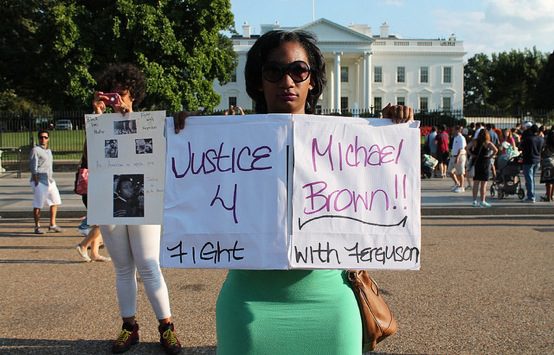What Ferguson Has Revealed

“Whatever happened to Michael Brown in the moments before he died has become secondary to what the response to his death has revealed,” Jelani Cobb wrote in The New Yorker. Since a police officer shot and killed the unarmed black teenager in Ferguson, Missouri on August 9, the shooting—and the vigils, looting, volunteer cleanup, peaceful protests, and overwhelmingly disproportionate police response—has become a national microcosm of urban racial injustice and what is being called the “militarization” of police forces.
Deadspin’s Greg Howard summarized the tensions at play:
If officers are soldiers, it follows that the neighborhoods they patrol are battlefields. And if they’re working battlefields, it follows that the population is the enemy. And because of correlations, rooted in historical injustice, between crime and income and income and race, the enemy population will consist largely of people of color, and especially of black men. Throughout the country, police officers are capturing, imprisoning, and killing black males at a ridiculous clip, waging a very literal war on people like Michael Brown.
That war is enabled by military-grade weaponry available to police since the 1990s under the Department of Defense’s Defense Logistics Agency and the “section 1033” program over which it presides. In Rise of the Warrior Cop, John Payne explained earlier this year, journalist Radley Balko makes the case that the Founders would have seen that kind of militarized police as an unconstitutional standing army. Balko wrote, “Just before the American Revolution, it wasn’t the stationing of British troops in the colonies that irked patriots in Boston and Virginia; it was the England’s decision to use the troops for everyday law enforcement.”
Indeed, to many, the scenes of tear gas seemed more like images from Iraq and Afghanistan than suburban St. Louis (even though tear gas is illegal in warfare, if legal domestically). Jamelle Bouie, writing for Slate, was among them:
This would be one thing if Ferguson were in a war zone, or if protesters were violent—although, it’s hard to imagine a situation in which American police would need a mine-resistant vehicle. But an episode of looting aside, Ferguson police aren’t dealing with any particular danger. Nonetheless, they’re treating demonstrators—and Ferguson residents writ large—as a population to occupy, not citizens to protect.
Veterans spoke out against “militarized” police action in Ferguson on Twitter. Jason Fritz observed, “As someone who studies policing in conflict, what’s going on Ferguson isn’t just immoral and probably unconstitutional, it’s ineffective.”
Adam Weinstein put it more bluntly at Gawker. “The U.S. armed forces exercise more discipline and compassion than these cops.” He cites the first page of the Army’s field manual on civil disturbances, which emphasizes proportional, nuanced responses. “Inciting a crowd to violence or a greater intensity of violence by using severe enforcement tactics must be avoided.” The manual also notes that “highly emotional social and economic issues” inform such disturbances, and that “it takes a small (seemingly minor) incident” to set off violence “if community relations with authorities are strained.”
Unlike the military, who are trained in nonviolent options for conflict resolution, the police often lack such knowledge. Bonnie Kristian expounded this failure and reasons behind systematic police brutality earlier this summer, noting also that cops are rarely held accountable for abuse. “Only one out of every three accused cops are convicted nationwide, while the conviction rate for civilians is literally double that.”
The entrenched racial injustice behind Michael Brown’s death will be difficult to root out, as it has been over centuries of American history. But the decades of policy that allowed for police abuse of Brown, and his town’s peaceful protesters, could be reversed—and if the public outcry over Ferguson is anything to judge by, Americans will be keeping a closer eye on the police in the coming years.
Comments